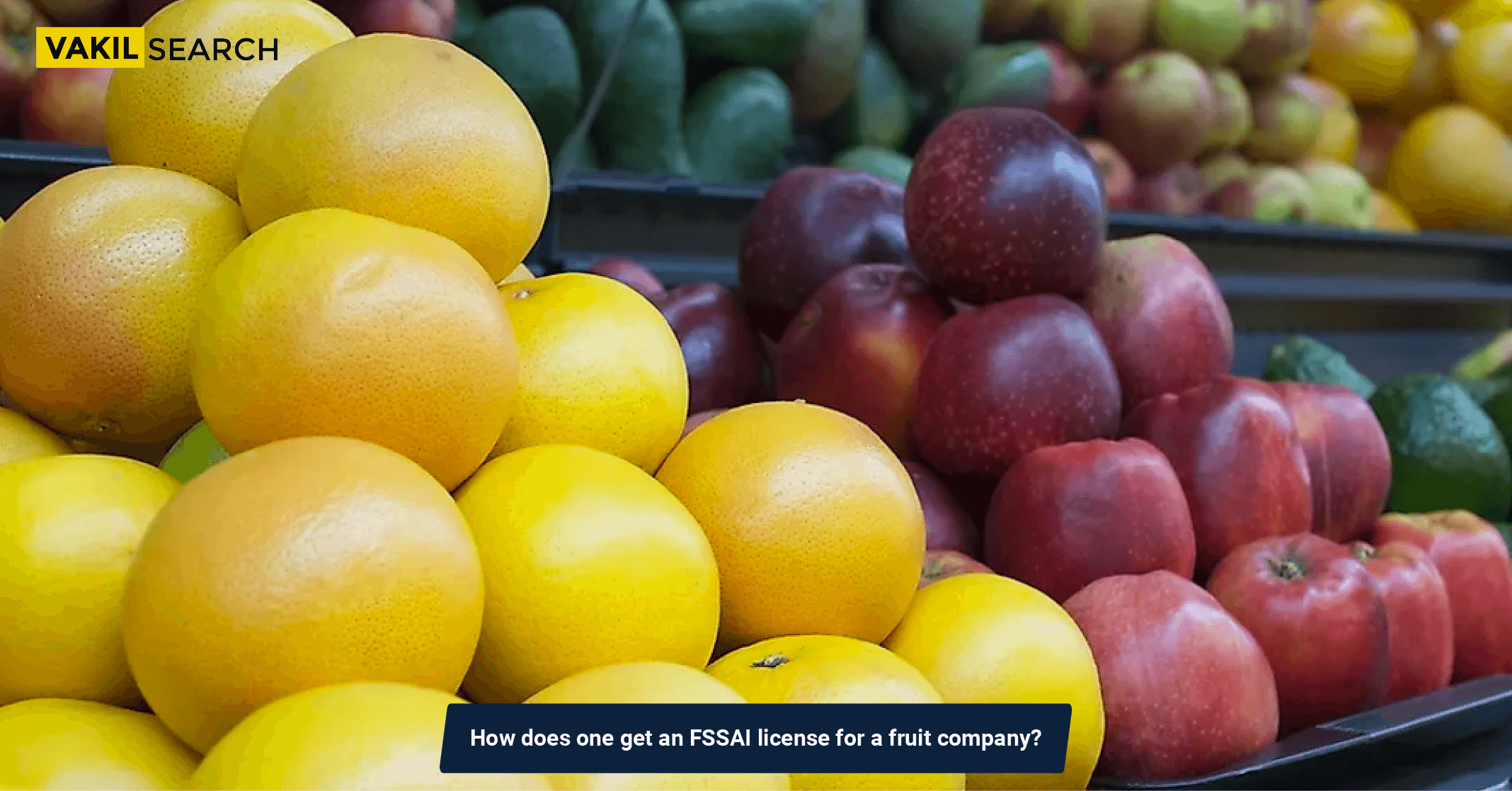To obtain an FSSAI license for a fruit company, you must follow specific guidelines and procedures set by the Food Safety and Standards Authority of India. This includes meeting hygiene and safety standards, submitting the required documentation, and adhering to the regulatory framework.
Introduction
In India, the Food Safety and Standards Authority of India (FSSAI) serves as the primary authority regulating and overseeing food-related matters. For individuals planning to venture into the fruit business, securing an FSSAI license is not just beneficial but also mandatory. This license, issued by the FSSAI, ensures adherence to food safety standards and legal compliance within the food industry. In this detailed guide, we will explore the process of obtaining an FSSAI license for your fruit company, the benefits it offers, and how VakilSearch can assist you in this endeavour.
What Is the FSSAI License?
The FSSAI license is a legal requirement for individuals aspiring to operate a fruit business in India. The FSSAI, functioning under the Ministry of Health and Family Welfare, operates in accordance with the FSSAI Act, 2006. This reputable authority monitors and regulates companies within the food sector, ensuring strict adherence to established guidelines.
There are three primary types of FSSAI licenses:
Basic FSSAI Registration: Applicable to small businesses with an annual turnover below ₹12 lakhs.
FSSAI Central License: Suitable for larger operations with a national presence and an annual turnover exceeding ₹20 crores.
FSSAI State License: Designed for businesses operating within a state with annual turnovers ranging from ₹12 lakhs to ₹20 crores.
Benefits of Obtaining an FSSAI License for a Fruit Company
Securing an FSSAI license offers numerous advantages to your fruit business, including:
- Establishing clear food safety policies with regulatory guidance.
- Access to research studies and evidence for improving food standards.
- Continual updates and advancements in food safety standards.
- Meeting international benchmarks for food safety, enhancing credibility.
- Attracting and retaining customers by assuring product quality.
- Operating your business without legal hassles.
Documents Required for Obtaining an FSSAI License for a Fruit Company
The documentation requirements vary depending on the type of FSSAI license:
For FSSAI Registration:
- ID proof
- Passport-sized photograph
For FSSAI State or Central License:
- ID proof
- Proof of address
- Import/export code
- Passport-sized photograph
- List of all directors or partners
- Certificate of incorporation
- Memorandum and Articles of Association (MoA and AoA)
- NOC from the municipality
How to Obtain an FSSAI License for a Fruit Company
The process of obtaining an FSSAI license involves several steps:
Determine the Appropriate License Type:
Begin by determining the most suitable FSSAI license type for your fruit company based on your annual turnover and business scope.
Seek Expert Advice if Needed:
If you have any doubts regarding the required license type, consult with our legal team for guidance on the appropriate license category for your business.
Gather Essential Documents:
Collect all the necessary documentation required for your chosen license category.
Review and File Your Application:
Double-check all paperwork for accuracy and completeness before submitting your FSSAI license application through VakilSearch.
Facilitate Authorities’ Requirements:
Be prepared to assist authorities if they require additional proof, have questions, or need to inspect your premises.
Approval Process:
The approval process may take up to 20 days for a basic FSSAI license.
Receipt of License:
Once approved, you will receive a digital and paper copy of your FSSAI license at your registered address.
FSSAI’s Clean and Fresh Fruit and Vegetable Market Initiative
The FSSAI has initiated the Clean and Fresh Fruit and Vegetable Market Initiative to ensure the availability of hygienic fruits and vegetables nationwide. This programme aims to upgrade unorganised retail sectors, such as pavement vendors and pushcart fruit sellers, and integrate them with organised retailers.
Key Guidelines of the Initiative:
- Registration under Food Safety and Standards Regulations, 2011 is mandatory for all fruit and vegetable vendors.
- Vendors must display their FSSAI license number with the appropriate green colour code.
- Artificial ripening of fruits using carbide or acetylene gas is prohibited.
- Labels on products must contain relevant information.
- Fruits and vegetables must be free from harmful chemicals and mineral oil.
- Specific waxes (beeswax, carnauba wax, or shellac wax) must be used for coating, with proper labelling.
- Vendors must position their carts away from areas of high environmental pollution.
- Regular water quality testing is required.
- Maintenance of supplier records is necessary.
- Under this initiative, local authorities will recommend suitable markets and vendors to the FSSAI. After implementing the required changes and training, vendors can receive a clean and fresh fruit and vegetable market certification.
How VakilSearch Can Assist You
VakilSearch offers valuable assistance throughout the FSSAI licensing process for your fruit company:
- Expert advice on the appropriate FSSAI license for your business.
- Verification and correction of required documents, including category lists, Form B, and NOCs.
- Filing of the FSSAI license application on your behalf.
- Ongoing updates on the application’s progress.
- Assistance in obtaining the FSSAI license and enjoying its associated benefits.
In conclusion, obtaining an FSSAI license for your fruit company is not just a legal requirement but also a strategic step to ensure the quality and safety of your products. By sticking to the FSSAI guidelines, you not only contribute to a healthier food industry but also build trust with customers and unlock opportunities for business growth. With expert guidance from VakilSearch, knowing the FSSAI licensing process becomes a smoother and more efficient journey for your fruit company.




